Seventh Row’s editors pick the 20 best supporting performances of 2020, from Matthew Macfadyen to Naomi Ackie. This is part of our 2020 wrap up series.
Over the next few weeks, we’ll be publishing longer essays on some of the best work on films this year, including the performances of Adam Beach, David Thewlis, and Théodore Pellerin. Read those essays here.
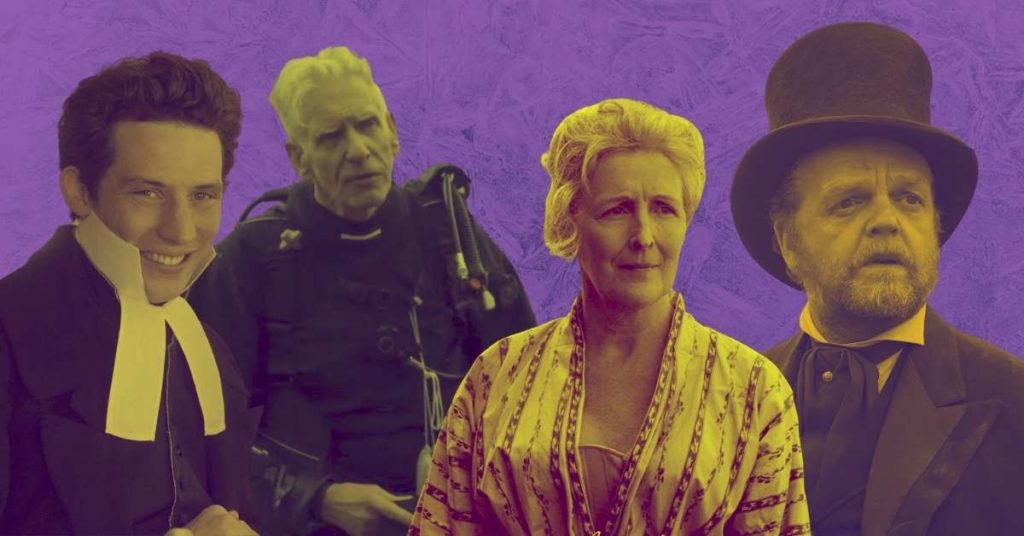
Discover one film you didn’t know you needed:
Not in the zeitgeist. Not pushed by streamers.
But still easy to find — and worth sitting with.
And a guide to help you do just that.
While it’s delightful to watch a master tear into a meaty lead role, the mark of a truly great actor is the ability to make a supporting part feel important, despite limited screen time. Some of the actors on this list of 20 play second fiddle to the lead throughout the film in question — Gael García Bernal in Ema, Yeri Han in Minari — and some only appear for one scene — Matthew Macfadyen in The Assistant. All of them make a huge impression, if not flat out stealing the film.
A quick disclaimer: we’re not counting Steve McQueen’s excellent Small Axe series in our best films of 2020 list because we consider all five films or episodes a part of a TV series, pieces that are part of a greater whole. However, we’re bending the rules a little bit when it comes to performances, because they are more comparable to other film, rather than TV, performances — each actor performs a character arc across one installment and doesn’t appear in any other installments.
Before we get started, here are some honourable mentions for best supporting performances: I Used to Go Here ensemble, Let Them All Talk ensemble, Bo Burnham (Promising Young Woman), Charles Dance (Fanny Lye Deliver’d), Essie Davis (True History of the Kelly Gang), Elizabeth Debicki (Burnt Orange Heresy), Brian Dennehy (Driveways), Colman Domingo (Ma Rainey’s Black Bottom), Sarah Gadon (Black Bear), Dinita Gohil (Greed), Adèle Haenel (Deerskin), Jack Lowden (Kindred), Gugu Mbatha-Raw (Misbehaviour), Andrea Riseborough (Possessor), Saoirse Ronan (Ammonite), and Michael Stuhlbarg (Shirley).
Without further ado, here are our 20 favourite supporting performances of the year.
Kingsley Ben-Adir, Eli Goree, Aldis Hodge, and Leslie Odom Jr., One Night in Miami…
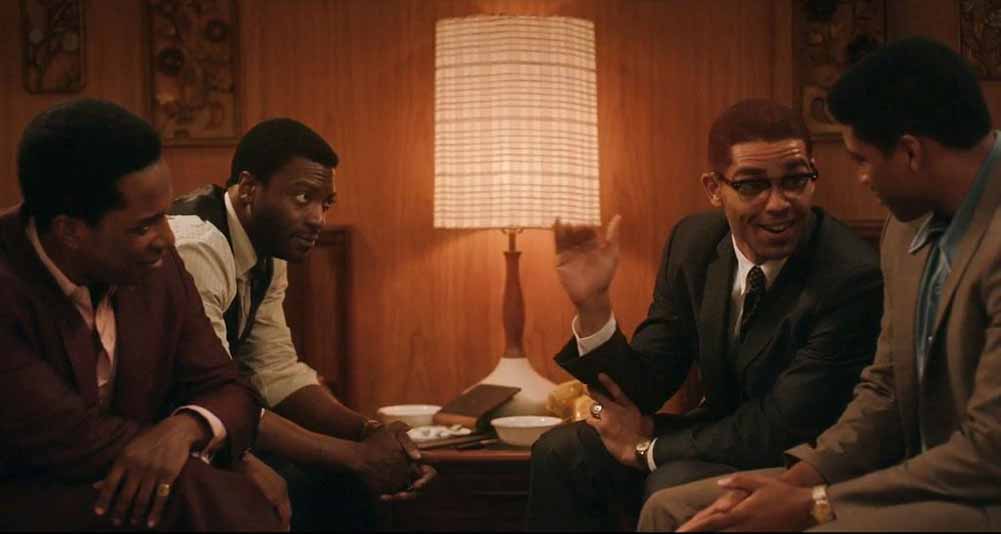
It’s hard to pick a standout in the ultra-charismatic cast of One Night in Miami. Regina King’s first feature is a showcase for Kingsley Ben-Adir (playing Malcolm X), Leslie Odom Jr. (Sam Cooke), Eli Goree (Cassius Clay), and Aldis Hodge (Jim Brown). The film, which is based on a play, takes place mostly in a hotel room where all four men celebrate Clay’s win (this is just before he changed his name to Muhammad Ali) and eventually come to heads over their conflicting approaches to activism.
None of these performances come across as crude imitations; rather, each actor captures the unique and potent form of charisma of the real-life figure they’re playing. Goree has the energy of a labrador as Clay in his early 20s: he’s loud, loveable, and energetic, even at one point bouncing up and down on the hotel bed. Hodge’s Brown is the most thinly written of the four, and yet Hodge is so magnetic that it makes up for his sidelining. He conveys a man with a strong, reassuring presence, so it makes sense that he’s the one to take Malcolm X aside and give him a pep talk near the end of the film. Ben-Adir is striking as Malcolm X, who always feels like the epicentre of the room even though he’s the stillest and often the quietest there. You really get the sense of why Malcolm X was the respected and powerful leader he was without Ben-Adir having to over-stress his importance.
If anyone shines brightest in this stellar cast, it’s Leslie Odom Jr. as Sam Cooke, and it’s not just because we get to hear Odom Jr.’s gorgeous singing voice. Cooke’s arguments with Malcolm X fuel the film’s tension: Malcolm X wants Cooke to stop pandering to white audiences with his music and write something more overtly political; Cooke is a staunch pragmatist who’s reluctant to risk giving up his seat at the table. It’s impossible to tear your eyes away from Odom Jr., who skillfully balances Cooke’s inner conflict with the way he projects cocky charisma to those around him. What’s more, the powerful final moments, in which Cooke performs “A Change is Gonna Come,” hinges on Odom Jr.: not just his amazing voice, but the way he acts through song to bring the story to its emotional resolution. Orla Smith
One Night in Miami… will be available worldwide on Amazon Prime on January 15th, 2021.
Naomi Ackie, Education
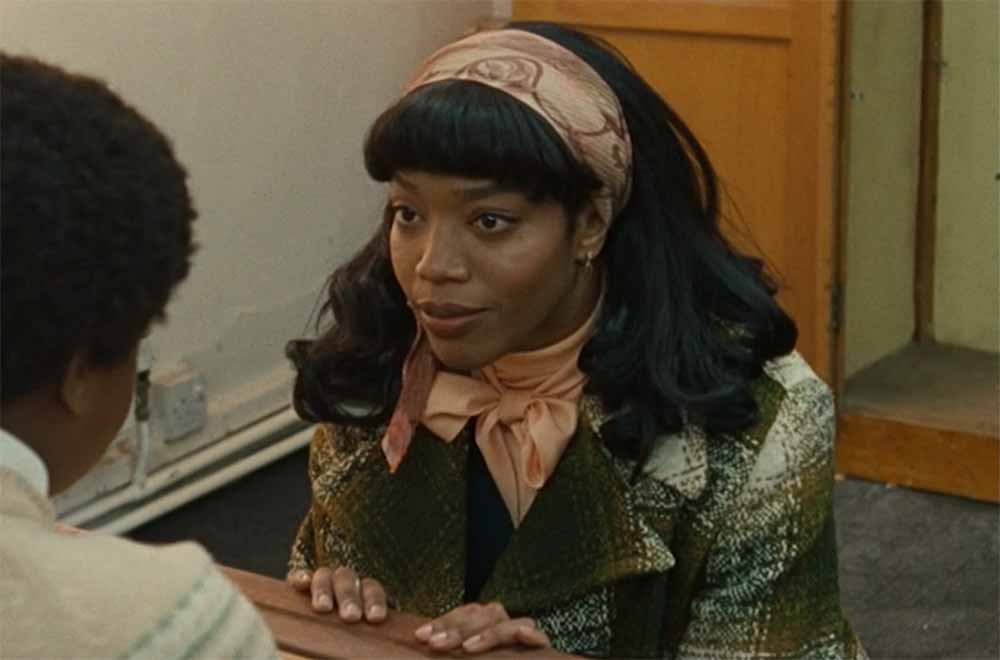
I first noticed the brilliant Naomi Ackie in her performance in Lady Macbeth. She stood out in an underwritten role in which her character is rendered mute and then victimised by the protagonist. Ackie conveyed a complex and compelling character without words, going above and beyond the material the script provided. It wasn’t until Education, however, that I truly realised what a star she is.
Ackie strides into the film about a third of the way through, and as soon as she appears on screen, you instinctively sense that she’s important. Ackie has incredible charisma when she’s given a part like this that allows her to flaunt it. Her character, Hazel, greets young protagonist Kingsley (Kenyah Sandy) at school with a broad, welcoming smile, maintaining steady eye contact with him as she speaks to make sure he feels heard. Hazel is one of the leaders in an organisation dedicated to ensuring young West Indian children in Britain are given the education they deserve, which the British schooling system is depriving them of. Thus, Ackie’s appearance in the film is a harbinger for hope for Kingsley.
Hazel addresses Kingsley and the children in the class in a way that no other adult in the film has so far: with respect, care, and attention. Ackie delivers one of the most moving lines of the film when she tells a young Black girl in the class, “I’m Black and I love being Black,” delivering the line patiently and with relish, while bending down to the girl’s eyeline. The girl, who has previously tried to distance herself from her Blackness, grins sheepishly, clearly moved and inspired by Hazel’s presence. It’s a small moment, but we gather the girl will remember it for years to come, because it’s hard to forget a presence as magnetic as Ackie’s. OS
Education is available on Amazon Prime in Canada and the US, and on BBC iPlayer in the UK.
Listen to our podcast episode about Small Axe.
Niamh Algar, Calm with Horses

Nick Rowland’s Calm with Horses (aka The Shadow of Violence) is a veritable who’s who of emerging Irish actors, from Barry Keoghan (one of Seventh Row’s Emerging Actors to Watch at TIFF 2018) to Hazel Doupe (star of 2018’s Float Like a Butterfly), plus a performance by David Wilmot, that trusty character actor always on hand to play the king of the thugs (think ‘71).
And yet the standout performance in the film comes not from its star Cosmo Jarvis (previously seen in Lady Macbeth) but Niamh Algar, as the mother of the protagonist Arm’s (Jarvis) child. She is at turns smart and no-nonsense, but shows the kind of tenderness to Arm of an old lover, suggesting a world of history between the pair. Sadly, Algar was last seen lighting up the BBC’s dead-on-arrival MotherFatherSon, as the son’s lover, and one of the only characters on that show with a heartbeat. Algar’s work in Calm with Horses proves she’s continuing to be a force to reckon with. Alex Heeney
Calm With Horses (AKA The Shadow of Violence in North America) is available on VOD and Hoopla in Canada, VOD in the US, and Netflix in the UK.
Adam Beach, Monkey Beach

An excerpt from our essay on Beach’s performance: “Adam Beach appears in only a handful of scenes of Monkey Beach as protagonist Lisa’s (Grace Dove) Uncle Mick, but he leaves such a lasting impression, you’re convinced he must have been on screen longer. Uncle Mick is a residential school survivor, world traveler, rebel, and doting uncle, and Beach constantly layers Mick’s anger, trauma, kindness, and political awareness into his performance. Beach has so much natural charisma that you wonder how he hasn’t been cast in absolutely everything. That charisma is so perfect here because Mick looms larger than life in Lisa’s memory, and in Beach’s hands, you feel that larger than life charisma, his warmth, as well as how broken he is.
We first meet Mick in a flashback to Lisa’s childhood. They’re in Lisa’s principal’s office, where he’s been called in as her temporary guardian because she’s in trouble. We learn quickly that Mick doesn’t take settler colonial authority seriously when he turns a disciplinary meeting into a bonding moment with Lisa, almost entirely ignoring the principal. Seated opposite the principal, he turns to Lisa in mock outrage, parsing out his words, to ask, “Lisa, have you been beating up boys again?” On learning that she used ‘The F word’ while repeating lyrics from “Fuck the opressors,” he laughs, pulls down his fist in victory as he look at her with a proud grin, before turning back to the principal to explain, “I taught her that song.” He then turns to give her five. Every time the principal says something, he turns to Lisa conspiratorially, taking up more space, grinning at her, letting her know he’s on her side.”… AH
Keep reading our essay on Adam Beach’s performance in Monkey Beach.
Monkey Beach played theatrically in Canada earlier this year, and will be available to stream on Crave in 2021. It is still seeking distribution in the Us and UK.
Gael García Bernal, Ema
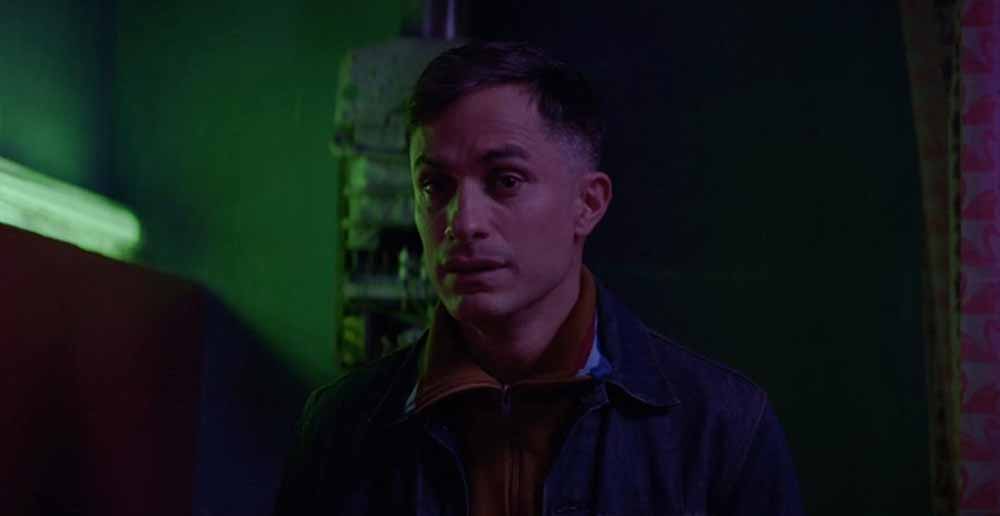
Ema marks Bernal’s third collaboration with Chilean filmmaker Pablo Larraín (after No and Neruda) with whom Bernal has done some of his career best work. In Neruda, he gave one of the great comic performances as the fictional detective (in a ridiculous mustache) chasing after the poet on the run. On the surface, Bernal seems more sedate in Ema, a film that presents as a melodrama, but plays like a comedy on second viewing — though there are plenty of laughs even at the first round. But Bernal’s choreographer character, Gastón, in Ema might actually be his great comedic tour de force. Rewatching the film, I wanted to screen cap every frame he’s on screen because he has the most amazing facial expressions, whether it’s looking at his wife like she’s completely bonkers or getting angry at reggaeton.
Bernal’s performance is the quieter one compared to Di Girolamo as Ema (whom we wrote about in our best lead performances list), a woman who literally lights things on fire for fun. But he’s a perfect counterpart to her. While everyone orbits around Ema throughout the film, and she’s in constant motion, Bernal spends the early part of the film almost completely still except for his eyes and subtle changes in his face. He says very little, while his reaction shots reveal he’s constantly looking at Ema in an effort to puzzle out just how bananas she must be, and how he can still be in love with her. At the same time, you can see his barely contained grief as he often looks like he’s on the verge of tears, his eyes watery. He’s in shock from losing his son, which might explain why he can respond to being called “a human condom” by barely even twitching, or listen to a social worker call him and Ema psychopaths while he calmly drinks from his mug with his eyes widening because she has a point. Bernal is equally convincing here as a man in the midst of grief, who has stopped being able to care about what ridiculous thing his wife has just done, while also completely, madly devoted to her.
Bernal’s marked stillness lulls you into a sense that Gastón is the sane one in the relationship, but it’s only a matter of time before he starts having a mental breakdown, ostensibly over reggaeton music. While at a rehearsal with his dance company, he has an emotional outburst that has him screaming about how his son could dance because “Colombians are great fucking dancers!”, bent forward in retaliation, his entire body taut. Later, he storms off in a fit over the terribleness of reggaeton after watching Ema rehearse with her friends, looking back over his shoulder in disgust. His big comic set piece is the diatribe he gives about reggaeton, which he likens to moving to LA to give up and take selfies, while imitating the beats of the music with his whole body, and talking faster and angrier than we’ve seen throughout the film. Here, in reverse shot, Ema and her friends are still and in awe, as Gastón finally spirals. By the end of the film, Gastón comes off as just as bananas as Ema, even if the film’s final shots are more great reaction shots of Bernal, eyes wide, stock still, unable to believe the mess Ema has gotten them into. AH
Ema is available on Mubi and VOD in Canada and VOD in the UK. It will be released in 2021 in the US.
Read our interview with Mariana Di Girolamo and Pablo Larraín.
Ross Brewster, Sorry We Missed You
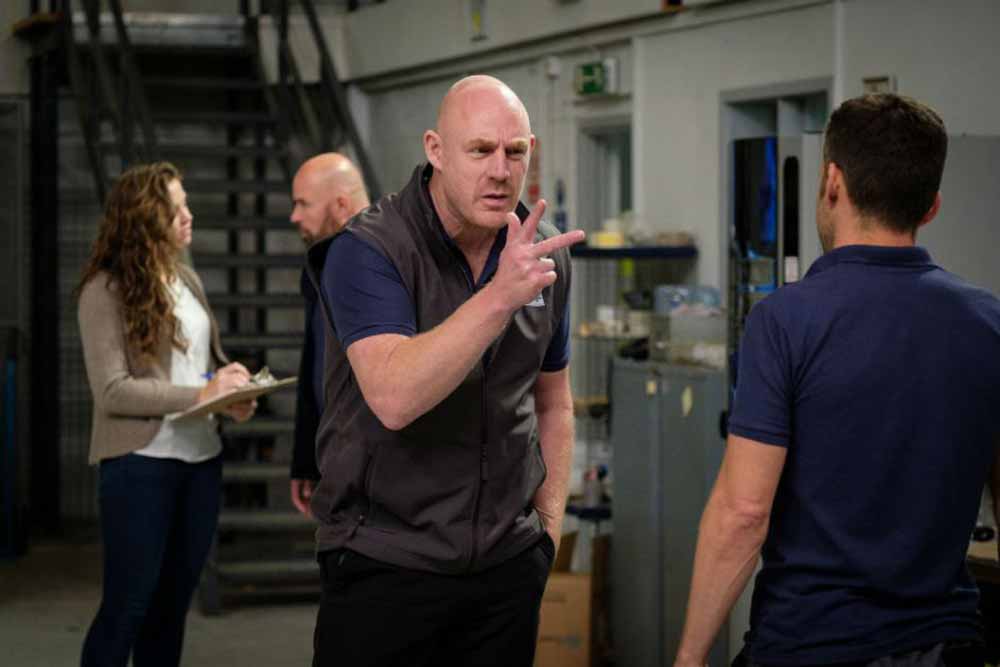
2020’s greatest villain was performed by Ross Brewster as Maloney, the employer of delivery driver Ricky (Kris Hitchen) in Ken Loach’s UK gig economy drama, Sorry We Missed You. No villain made me angrier because none of them feel as real as Maloney does. I’ve worked for this man; I’ve had friends who have worked for this man. As an employer who carelessly exploits his workers, Brewster captures the kind of ambivalence that can at first seem casual and inviting, but soon reveals itself to be a sign of a lack of empathy.
When Maloney recruits Ricky, he has a stern, imposing, and direct “no bullshit” attitude. He explains the terms of Ricky’s new job in a curt, direct manner, pausing for emphasis between each short line, and never taking his eyes off of Ricky. Brewster adopts a flat, dispassionate, but assured tone, which Ricky takes as a sign that Maloney will be a firm but fair and honest employer who will grant him the independence he has promised. In reality, it’s the first warning sign that Maloney has little empathy for his workers and will exploit them at will.
Later in the film, when Ricky comes back to the same office where he was hired and pleads for some time off, Brewster’s harsh stare and blunt delivery becomes even more insidious. He hammers out every consonant. “The shareholders should erect a statue in the car park of me, Maloney, Patron Saint of Nasty Bastards,” he tells Ricky, lacing his tone with the slightest hint of contempt but never once raising his voice. “You want a day off? It’ll cost you fucking £100 a go,” he continues, leaning hard into the word “fucking” to ensure that Ricky is thoroughly scared off. Brewster never tips over into caricature, as he understands that villainy in a story about the gig economy is not communicated through overtly evil moustache twirling, but through a casual lack of empathy. OS
Sorry We Missed You is available on Criterion Channel and Kanopy in Canada, Criterion Channel in the US, and Amazon Prime in the UK.
Listen to our podcast episode on Sorry We Missed You and Peterloo.
Jemaine Clement, I Used to Go Here
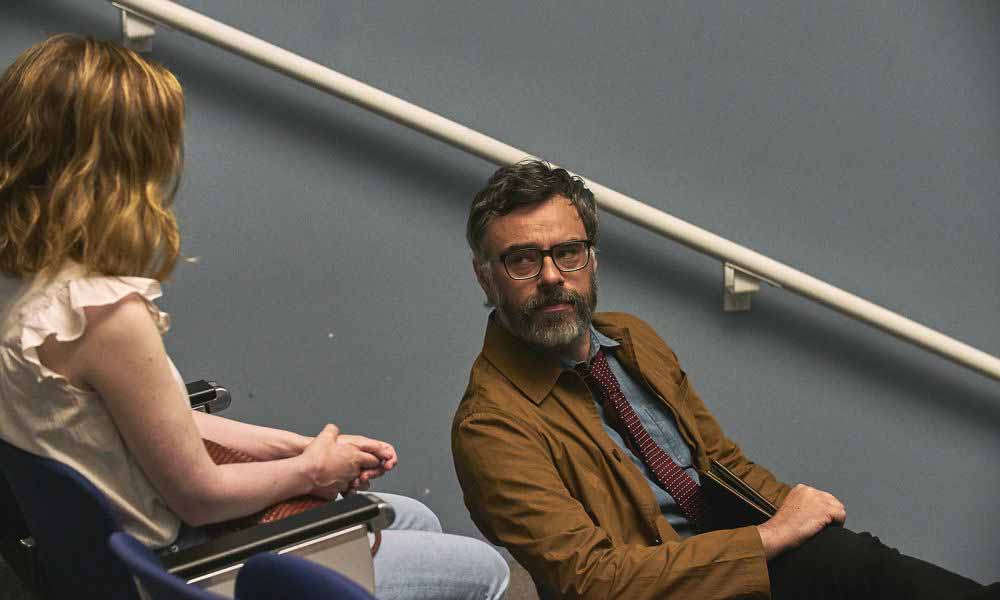
When Jemaine Clement’s college professor David first shows up in I Used to Go Here, he approaches Kate (Gillian Jacobs) with an awkward little walk between the aisles of the lecture hall. He struts up to her and swoops in with a hug, but his steps are a bit too belaboured for him to look as suave as he’s trying to be. It’s the walk of a man who used to be hot shit and still thinks he is, even though he’s aging and too old to be fucking his students (not that he ever should have been). He still knows how to turn on the charm though: he speaks to Kate quietly and casually, asking her if they can get a drink later without even looking at her. He knows that Kate adores him — he rejected her advances when she was his student, over a decade ago — and he’s ready to play her like a fiddle.
Clement plays David as charming enough to seduce his young student, April (Hannah Marks), but pathetic enough that the 35-year-old Kate soon wakes up to his bullshit. When Kate meets David in a bar to commiserate a bad New York Times review of her book, David drones on and on about himself in an attempt to console her. Even when Director Kris Rey holds on a closeup of the annoyed Kate, Clement’s hands soon invade Kate’s frame, wildly gesticulating, as he obnoxiously explains, “This is why I’m going to self publish my next novel” (nobody asked). Later, David’s cool façade drops when Kate and a group of other students break into his house and walk in on him in bed with April. Clement squeals a hilariously high-pitched “Jesus Christ!” that’s so different from the deep, smooth tones David usually puts on.
We finally see David’s layers of lies and manipulation peeled back when Kate confronts him about the fact that he hasn’t even read her novel. “Of course” he has, he says at first without hesitation, his tone ultra sincere, his body language calm. As soon as she provides evidence that he can’t dispute, he switches on a dime, wildly gesticulating, his tone shrill, as he tries to explain why she should feel bad for even expecting him to read the novel. Even then, when Kate calls him a dick, he has the balls to look taken aback, leaning back in shock as if he’s been slapped and whining, “Come on!”. David switches right back to charming mode as soon as his pride is hurt, but Clement has already thoroughly undressed this practiced manipulator’s tricks. OS
I Used to Go Here is available on Hoopla in Canada and the US, HBO and HBO Max in the US, and on VOD in the UK.
Read our interview with Kris Rey.
David Cronenberg, Clifton Hill
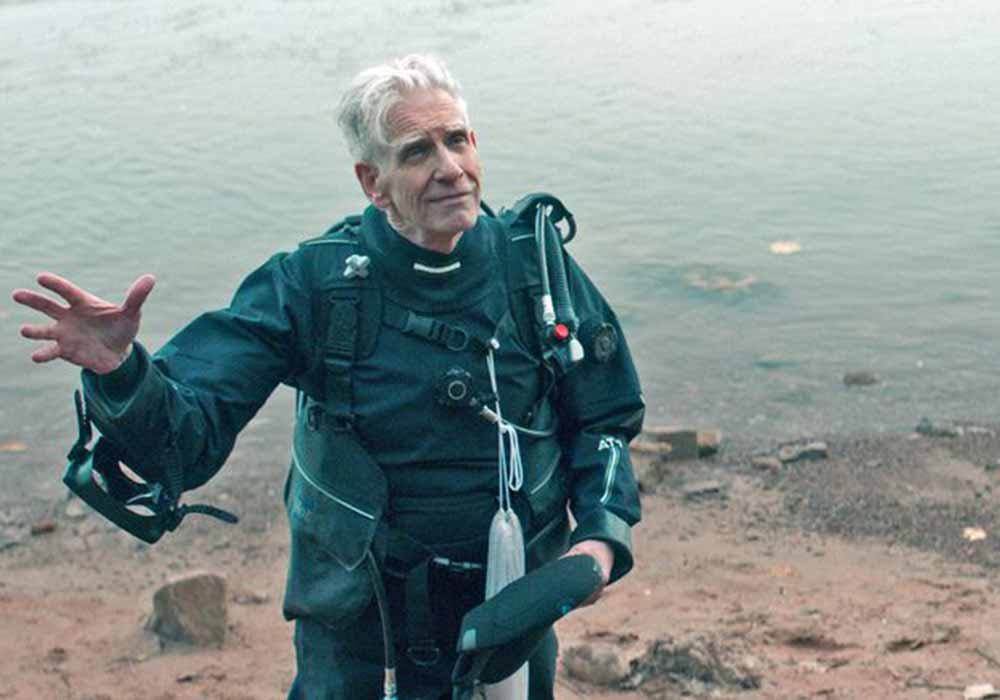
Appearing in just three scenes of Albert Shin’s Niagara Falls noir, Clifton Hill, David Cronenberg runs away with the whole movie, in a performance that Canadians and podcasters are still going to be talking about a decade from now. He also has one of the great film entrances of the year, surfacing in full scuba gear in the background of a shot of the protagonist. Yes, part of the joy of this character is that it’s Cronenberg playing an obsessive small-town podcaster, but it’s his performance that makes it so memorable, much of it in the quiet but expressive voice work and the outlandish hand gestures.
Within seconds of meeting Clifton Hill’s protagonist, Abby (Tuppence Middleton), he’s introducing himself as the town’s (clearly self-appointed) historian — said with such pride but little authority — and asking her if she likes podcasts. When stating the name of his podcast, “Over the Falls,” he adds a dramatic flourish with his hand. Before walking off, he stumbles over his words as he awkwardly asks her to rate and review the podcast, before slowly walking out of frame, hunched, and you get the impression he says this to everyone he meets — and is desperate to climb the podcast rankings. Later, we hear him reading the ridiculous ads for his podcast with such serious conviction, almost excessively expressive vocally, moving his hands for emphasis, like an amateur trying to sound professional. He’s also completely convincing as someone who goes from unimpressed detachment to intense professional interest in Abby’s problem. AH
Clifton Hill is available on CBC Gem in Canada, Hulu in the US, and Netflix in the UK.
Matt Dillon and Lars Eidinger, Proxima

Alice Winocour’s portraits of men in Proxima are the rare case that acknowledge the men’s privilege and entitlement, and how that affects their interactions, while still presenting them as well-meaning, kind-hearted grown-ups. Lars Eidinger plays Thomas, Sarah’s (Eva Green) ex-husband with whom she co-parents, and Matt Dillon plays Mike, the astronaut team leader that she will be going to space with. Both men make not great first impressions, but Dillon and Eidinger layer nuance into their performances to show these men as flawed people with empathy, whose flaws are highly connected to their privilege.
We first meet Thomas when Sarah pulls him out of a meeting at work to talk to him about the logistics of caring for their daughter while Sarah is in space. He reluctantly excuses himself, frustrated, as he quietly asks her why she’s there, sighing repeatedly. Before she even gets a word in edgewise, he’s decided she’s there to harass him about canceling on their daughter at the last minute, his back to her at first, and then continues to make excuses for his past behaviour by avoiding eye contact with her. When he finally looks at her, there’s a terrific exchange: she beams, and you see it dawning on him what’s happened, that she’s going to space, and he smiles, excited for her before giving her a hug, a marked change from his previously unwelcoming body language. As they negotiate, he once again makes declarative statements, only occasionally looking at her. He’s soft-spoken but passive-aggressive, if reasonable.
The next scene introduces us to Mike, making a speech at a party celebrating the impending launch. He comes off as incredibly entitled as he reduces Sarah to a woman who cooks in his speech. After knocking on the window to encourage Sarah to join him at the barbecue, he introduces her to his wife, then looks away, before moving away to let them talk; he clearly means well, but it’s an awkward thing to leave his new colleague with his wife just because they’re both women. Later, when Sarah first meets him at training, he tries to offer her some friendly advice, indicated by his softer, lower voice. When he’s interrupted by their colleagues, he’s visibly uncomfortable that they have company, and keeps a low voice for a semblance of privacy. But he comes off as arrogant by never explaining how he feels. He doesn’t realise this until after the fact though, and his coaxing voice suggests there’s a kindness behind his sentiment… AH
This is an excerpt from our full essay on the men of Proxima, which will be published soon.
Proxima is available on VOD in Canada and the US, and on Netflix in the UK.
Read our Special Issue on Proxima.
Yeri Han, Minari
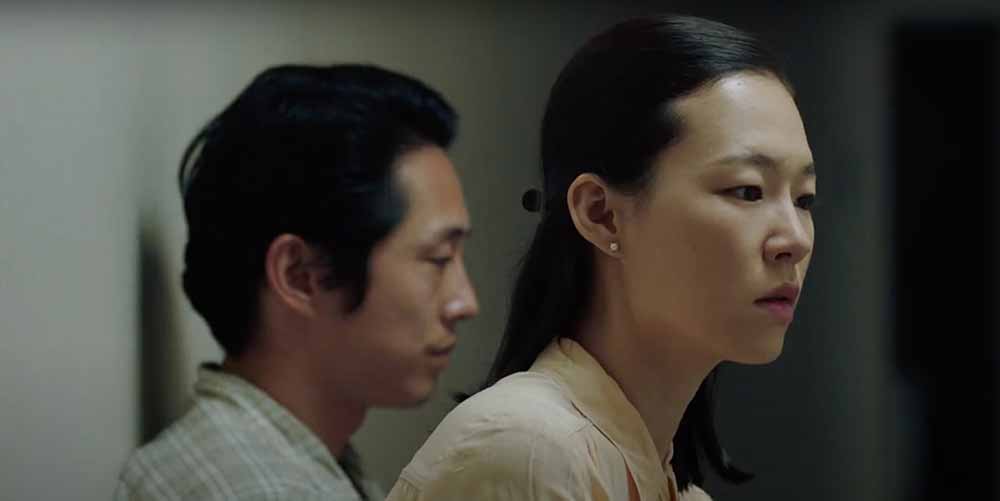
As Monica, the long suffering wife to Steven Yuen’s Jacob, Han Ye-ri is the most underrated and strongest member of the Minari ensemble. She’s so compelling that I wished the film had been told from her perspective — even though she plays second fiddle to Yuen and Alan S. Kim, who plays her son. The film is about Jacob’s ambition to set up a farm in Arkansas so that he can build a self-sustaining life for his family: when the film starts, on the day they move into the farm, Monica is already disillusioned with her husband’s risky pursuit of the American Dream.
Monica is practical, less of a dreamer, and from moment to moment, you can see her internally negotiating which battles to fight against her husband. You feel the intimacy and history between Monica and Jacob through how Han physically interacts with Yuen, such as when she sits on the edge of a bathtub, bathing her husband, her body slouched toward him. But while Jacob is preoccupied with tending his farm, you sense how far the couple have drifted apart from the way Monica looks on silently. Han’s expression is often solemn and detached, her gaze faraway even when she’s standing right next to a family member or talking to them. Her posture is still and closed off, her arms often crossed when she’s not using her hands. Her performance suggests a woman who has learned to bite her tongue more often than not, after years of trying and failing to reason with her charismatic, idealistic husband. OS
Minari will be released in the US on February 12th, 2021 and in the UK on March 19th. Its Canadian release date has not yet been set.
Sandra Hüller, Sibyl

Each time I see Sandra Hüller in a new role, I’m reminded of how much I love her. Whether she’s fully committing to “Greatest Love of All” in Toni Erdmann or portraying a woman trapped in an abusive marriage in In the Aisles, Hüller layers emotional complexity into every performance. In Sibyl, she plays Mika, an exasperated film director who desperately tries (and fails) to separate her work from personal drama. When her partner, Igor (Gaspard Ulliel), a lead actor in her film, has an affair with his co-star Margot (Adèle Exarchopoulos), Mika reacts with brusque matter-of-factness, resulting in peak comic hilarity. As Margot nervously confronts her, Mika smiles and shrugs, using casual body language and tone of voice to lighten harsh statements like, “The more you thank me, the more I hate you.” Hüller plays the scene as someone who is self-effacing and task-oriented, but teetering on the verge of destruction. She’s trying to maintain a façade of control to mask the fact that everything is falling apart. Her performance is something akin to the “this is fine” meme where a little dog wearing a hat sits smiling in a room engulfed in flames. Hüller’s comedic timing is impeccable, allowing her measured irritation to rise closer to the surface with each line of dialogue.
Hüller masterfully walks a tightrope between full control over emotions and complete personal destruction. Even when she’s pushed to her limit and exits a shoot in dramatic fashion (by jumping off a boat and swimming away), she does so with impressive efficiency. In every moment, Hüller reminds us that while Mika desperately needs to have a breakdown, she’s also acutely aware that time for one does not exist. This push and pull adds anticipatory tension to every scene with Mika, making her one of the most interesting characters in a film that’s full to the brim with them. Lindsay Pugh
Sibyl is available on VOD in Canada and the US. It is still seeking distribution in the UK.
Listen to our podcast episode about Justine Triet’s In Bed with Victoria and Sibyl.
Toby Jones, First Cow
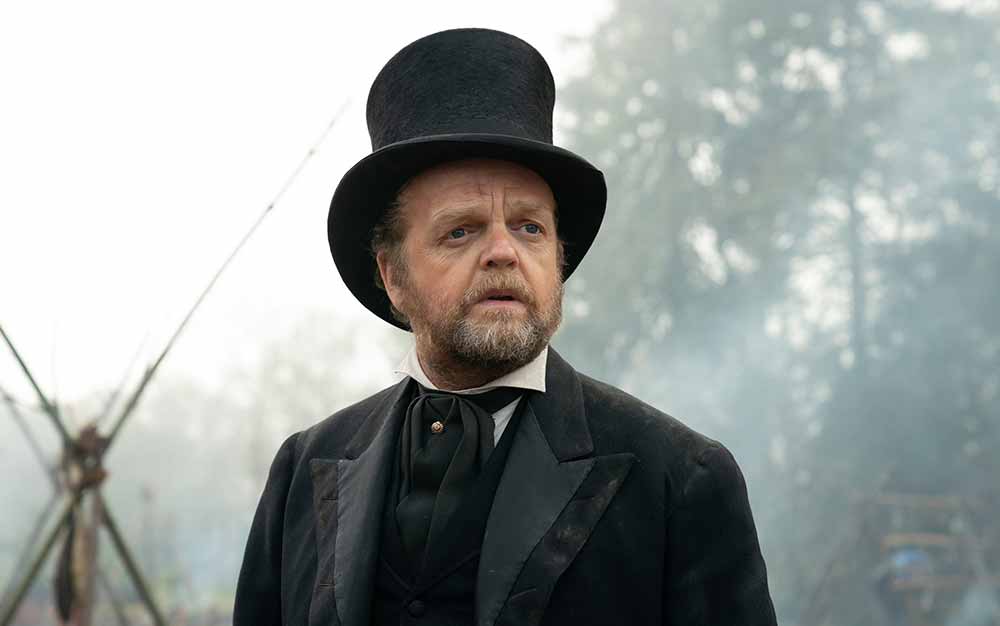
Toby Jones’s Chief Factor doesn’t even show up in First Cow until after the halfway mark, yet with just a handful of scenes, he leaves a lasting impression. When you finish First Cow convinced that Cookie’s oily cakes are the most delicious baked comestible ever made, it’s because of Jones’s reaction when he tastes one: his eyes crinkle in awe, before a wide smile crosses his face. Rather than looking directly at Cookie, he mumbles to himself about how he “tastes London in this cake”.
Between Jones’s diminutive stature, soft voice, and polite manners toward Cookie, his Chief Factor appears to be a relatively gentle soul. Once he decides he loves the cakes, he even condescends to talk kindly to Cookie, looking down, making eye contact, inquiring about his history. But Jones’s entrance into the film suggests some violence beneath the surface: his walking stick enters the frame before he does, tapping the shoulder of his employee who is napping while keeping guard. He then strides up past the queue of people waiting for oily cakes without even sparing it a glance. When he is face to face with Cookie and King-Lu, he doesn’t bother to introduce himself, assuming his top hat and tails will do the talking for him.
The balance between the Chief Factor’s polite exterior and inner violence is crucial to the film’s plot because Cookie and King-Lu aren’t privy to his more violent comments; to them, he appears mild-mannered and kind, which allows them to underestimate his wrath when he discovers they’ve been stealing from him. In a key scene, the Chief Factor offers his completely uneducated opinion on appropriate punishment for mutiny at sea to a navy captain without even a little hesitation, while Cookie and King-Lu arrive outside, seen through the window. While advocating for a disabling amount of lashes as punishment, he never once considers things from the men’s point of view, or what such harsh punishment would mean: he remains soft-spoken and speaks authoritatively, never hesitating. It’s that instinct that gives the film it’s tragic ending. AH
First Cow is available on VOD in Canada and the US. It is still seeking distribution in the UK.
Read our ebook about Kelly Reichardt and First Cow.
Matthew Macfadyen, The Assistant
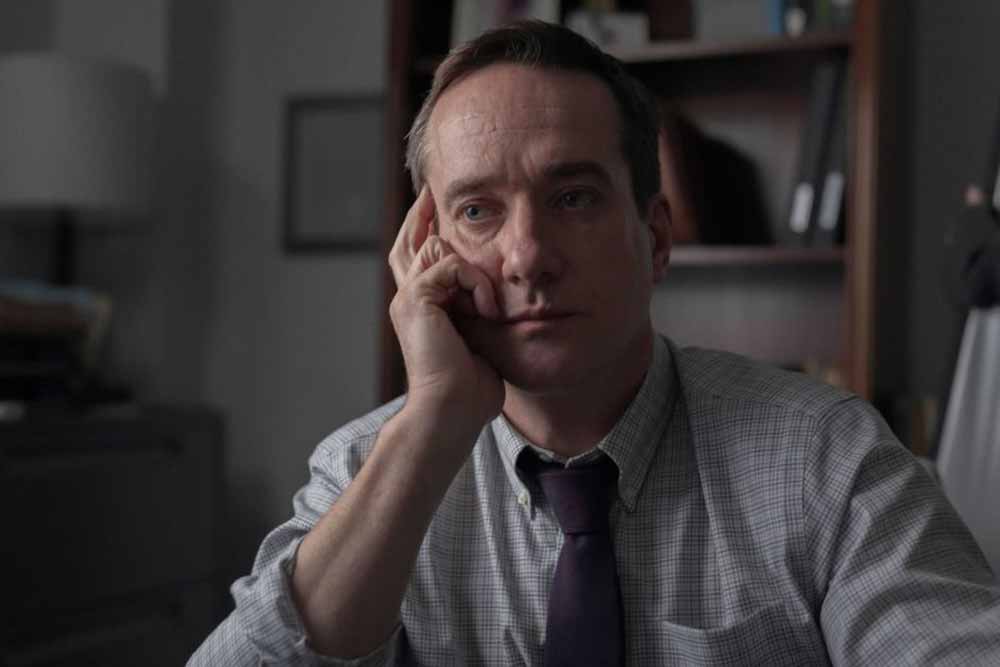
From our essay on Macfadyen’s performance: “Up until recently, I only really knew Matthew Macfadyen as the Mr. Darcy who was good but not as good as Colin Firth. Now the world is blessed to be experiencing the Matthew Macfadyessaince we never knew we needed. The actor has found his groove as a middle-aged character actor — not the romantic leading man Hollywood initially pegged him as. Succession brought him back into the public consciousness in a big way, but he’s had a great 2020 besides. Macfadyen excels at playing quiet and unassuming men who hold more power than they seem to on first glance, which made him a perfect choice to play a pathetic posh guy who ends up stealing a million pounds from Who Wants to Be a Millionaire in the miniseries Quiz.
Then, there’s his one-scene wonder in Kitty Green’s The Assistant, where he plays an HR consultant who appears mild mannered, kind, and helpful until you realise that he’s doing his part to cover up sexual abuse in the workplace. This scene, which takes place 50 minutes into the film, is probably my scene of the year, and it’s largely thanks to the intricate interplay between Macfadyen and Julia Garner (whom we wrote about on our list of the best lead actors of 2020). Garner’s character, Jane, is a worn-down assistant to a movie exec, and throughout a working day, she begins to suspect that her boss is sexually abusing women behind closed doors. She visits Macfadyen’s character to report this abuse, but in just 10 minutes, he convinces her that speaking out is the last thing she wants to do… OS
The Assistant is available on Crave+ in Canada, Hulu and Kanopy in the US, and Now TV or Sky Go in the UK.
James McArdle, Ammonite
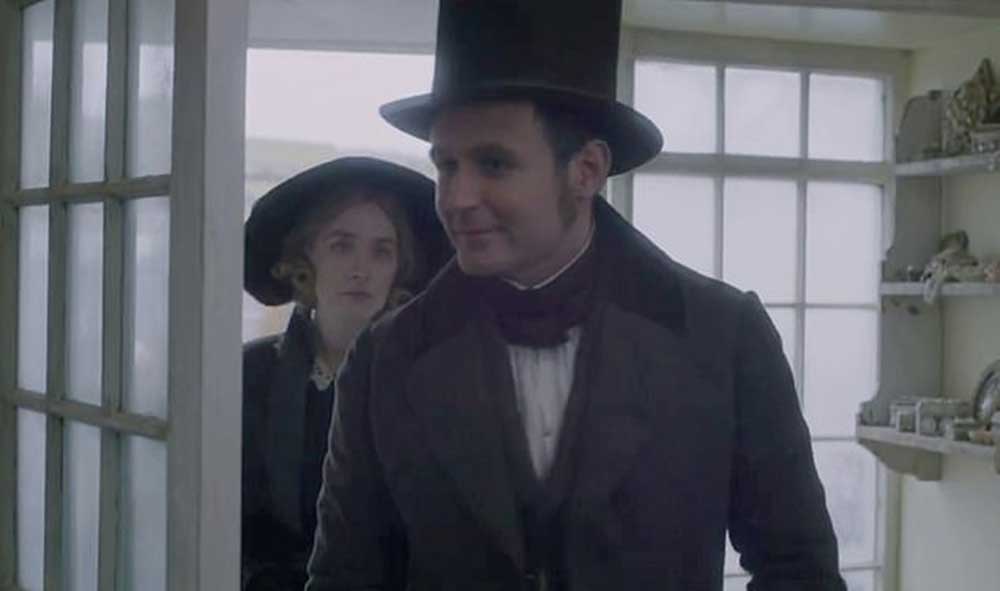
Although James McArdle only appears in Ammonite for a handful of scenes at the beginning of the film, he leaves a lasting mark. As Mr. Murchison, the posh, amateur paleontologist husband of Charlotte Murchison, McArdle is the embodiment of well-intentioned but oblivious, bumbling male privilege. He arrives unannounced to visit Mary Anning, with the expectation that she’ll stop everything she’s doing to teach him; his smiles, jovial manner, and excessive compliments suggest he thinks that his enthusiasm excuses any imposition. Even when Mary points out his privilege, he doesn’t know how to respond; McArdle pauses, as if unused to the challenge, smiling more.
McArdle crafts a complex portrait of a man who is a product of his time and yet, in some ways, forward-thinking in his respect for women — even as he undermines his good intentions at every step with his privilege. Out on the rocks with Mary, McArdle’s unsteady gait while wearing a superfluous top hat is both a great source of comic relief and an instant indication of how privileged and out of place Mr. Murchison is. The way he orders dinner for Charlotte without asking her opinion or even looking at her cements this man’s self-assurance and unconscious tyranny. And yet, for all his faults, he clearly loves and adores his wife, given how hard he works to bargain with Mary to take her on. And he reveres Mary, who has been overlooked by other men. AH
Fiona Shaw, Ammonite
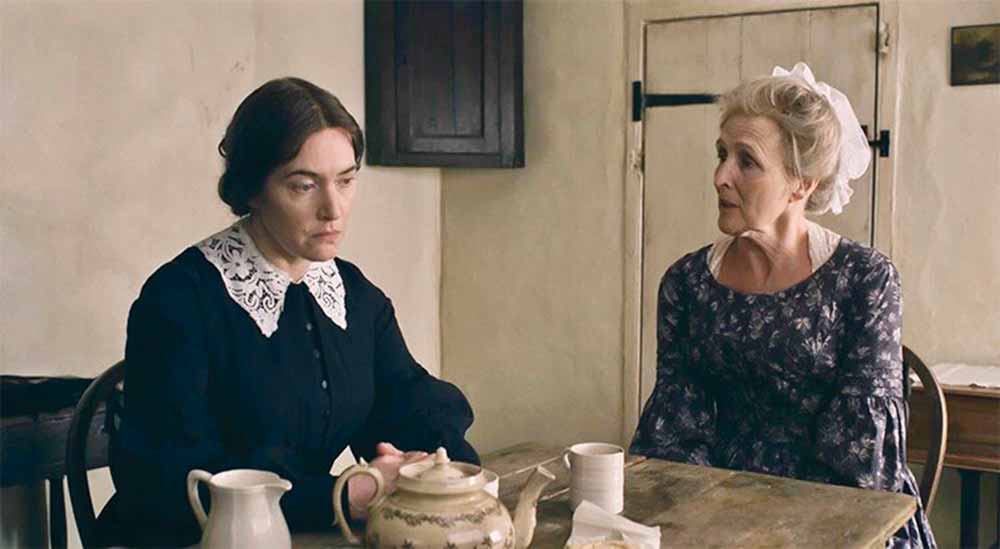
The legendary Fiona Shaw has just two scenes in Ammonite, but you understand so much about her character just from the way she holds herself, or the way she smiles warmly at Kate Winslet’s Mary Anning. Francis Lee’s method is to work with his actors for a while before shooting to map out their character’s entire backstory; nowhere is this more clear than in Shaw’s performance and her on-screen dynamic with Winslet. It’s never explicitly stated that her character, Elizabeth, is Mary’s ex-lover, but the way she lights up when she sees Mary makes you immediately suspect as much. Still, you also understand why — despite the affection in Elizabeth’s gaze at Mary — they’re no longer together. While Mary is closed off and withdrawn, Shaw plays Elizabeth as radiant, proud, and self-possessed. Somehow, Shaw has the ability to convey all this within her first few seconds of screentime, without a word having passed her lips. OS
Ammonite is available to rent on VOD in Canada and the US. It will be released in the UK on March 26th 2021.
Read our interview with Francis Lee.
Listen to our podcast episode on God’s Own Country and Ammonite.
Josh O’Connor, Emma.
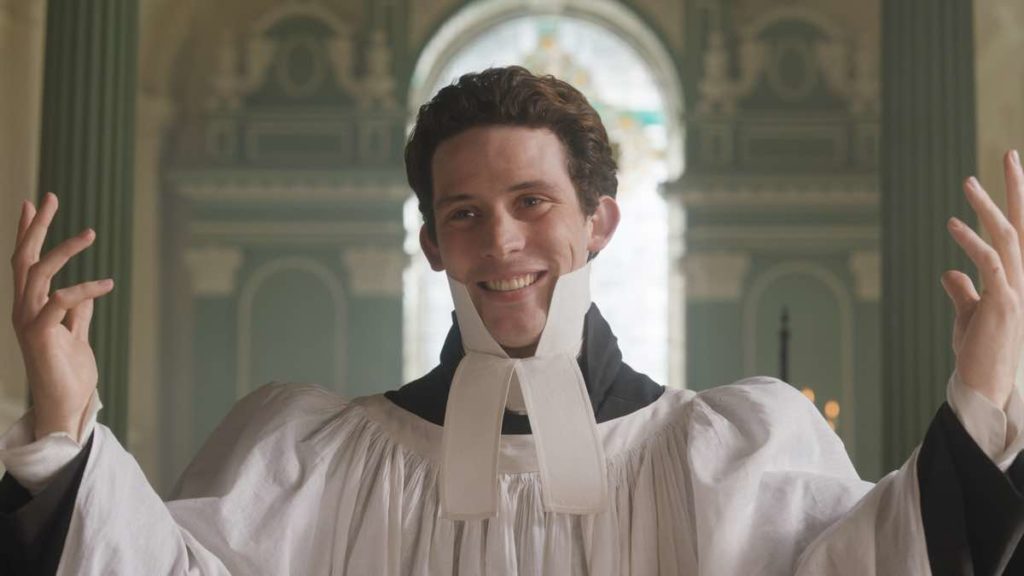
From our essay on O’Connor in Emma. and Hope Gap: “The first time we meet O’Connor’s Mr. Elton in Emma., he’s officiating a wedding with gleeful self-aggrandizement. Looking to the heavens, he announces in a high-pitched sing-songy voice, “We are gathered here today…” When he reaches the vows, he lowers his eyes in the direction of the groom with a decisive pause, reciting, “this man”, and then makes a show of shifting his eyes to the bride, pausing with comedic effect to spout, “and this woman.” It’s a series of subtle choices, but the perfectly timed movement of his eyes is enough for O’Connor to get the biggest laugh in the film thus far.
I have my reservations about the slapstick approach to Austen taken by Autumn de Wilde in this adaptation. But since Mr. Elton is already a thoroughly ridiculous man, O’Connor’s low-key physical comedy here is welcome, an amusing take on Austen’s character, which still fits within de Wilde’s heightened world. Indeed, his Mr. Elton often feels like one of Austen’s other famously irritating and silly clergymen, Mr. Collins, of Pride & Prejudice — especially in his repeated failed attempts to make any comment at all at a large dinner party, finally interrupting on the topic of the weather.”… AH
Emma. is available on Crave+ in Canada, HBO and HBO Max in the US, and Now TV and Sky Go in the UK.
Molly Parker, Pieces of a Woman
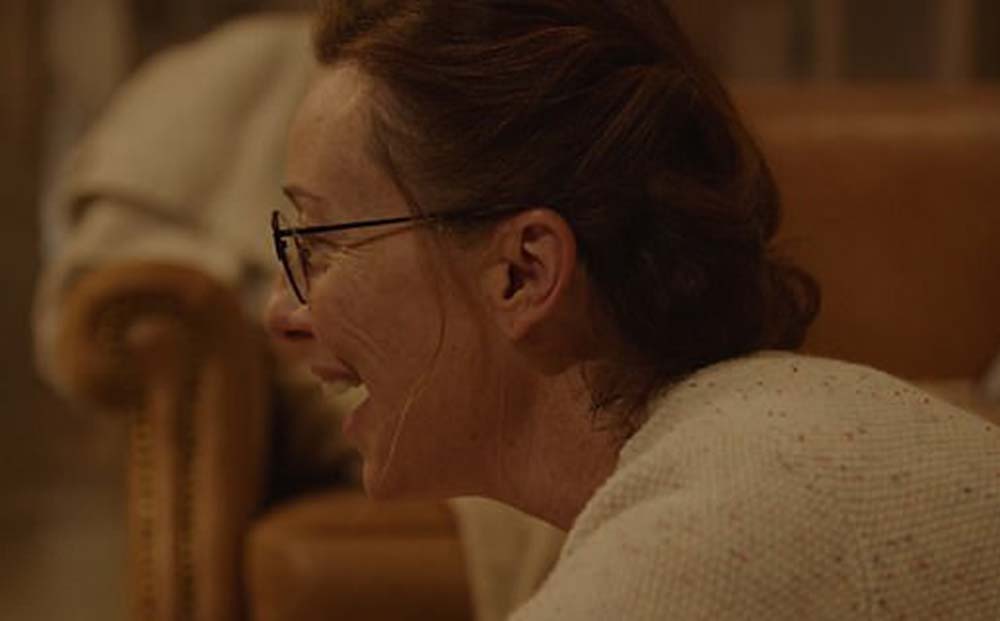
As the midwife, Molly Parker is the key third player in Pieces of a Woman’s already legendary 20-minute birthing scene. Vanessa Kirby is a powerhouse, sure, and Shia LaBeouf is a sturdy and supportive scene partner. But Parker is just as good. It’s an extremely unshowy performance: quite simply, she’s playing someone who’s unequivocally good at her job, which is important to establish given her professionalism is unfairly called into question later in the film. Parker conveys a woman who’s kind and deeply cares about every woman she helps to give birth, while never letting emotions cloud her clear head. When the birth takes a worrying turn, as the baby’s heartbeat slows down, the tension and dread of the scene lands squarely on Parker’s shoulders. She never overplays her worry; rather, over the course of several minutes, her frown grows deep and her voice becomes more taut and hurried. You can’t take your eyes off Parker: if something bad is going to happen to the baby, we know we’ll be able to read it on Parker’s face first, so each miniscule shift in her expression is a terrifying gut punch. OS
Pieces of a Woman will be available on Netflix worldwide on January 7th.
Théodore Pellerin, Never Rarely Sometimes Always and Souterrain

At just 23, emerging Québécois actor Théodore Pellerin has already earned a slot on our list of the best performances of the decade for Genèse, and inspired Justine Smith to explore his entire career so far in an essay for The 2019 Canadian Cinema Yearbook. This year, he had two great supporting turns: one in English, as Jasper, the creepy guy the girls meet on the bus in Never Rarely Sometimes Always, and one in French, as Julien, an ex-miner recovering from a car accident and traumatic brain injury in Souterrain.
Pellerin’s Jasper is someone adept at reading social cues, but entitled enough to willfully ignore them when they don’t suit. The minute he gets on the bus, he clocks Skylar (Talia Ryder) as someone he wants to hit on, even though she never looks at him, and keeps looking away from him once he starts talking to her. Undeterred, he remains fairly still — especially notable for an actor who is often constantly in motion — and confident, adopting a relaxed but engaged tone. When Skylar rebuffs him with a snide comment, he waits a beat and decides to tell her she’s funny rather than back off entirely.
By contrast, Pellerin is almost unrecognizable in Souterrain, not just because he’s covered in a light beard, wears a neck chain, and looks like he’s gained some significant muscle. But the differences between Julien and Jasper are not merely cosmetic. Whereas Jasper remained calm and still, reading people to figure out how to get what he wanted, Julien often avoids eye contact, hunched over and looking down because he feels insecure. Because Julien is recovering from a traumatic brain injury, it’s a more outwardly showy part: Pellerin must manage portraying Julien’s physical disability — a knee injury and loss of movement in one hand — and his brain injury, which has him constantly stuttering as he searches for the words he’s looking for. On the surface, it’s the kind of role movie stars take on to win Oscars. And yet, it’s Pellerin’s attention to Jasper’s emotional state and how he relates to others that really stands out… AH
This is an excerpt from our full essay on Théodore Pellerin’s 2020 roles, which will be published soon.
Never Rarely Sometimes Always is available on Crave+ in Canada, HBO and HBO Max in the US, and Now TV and Sky Go in the UK.
Souterrain’s Canadian release date is yet to be set, but it is streaming at the Whistler Film Festival across Canada until Dec 31. It is still seeking distribution in the US and in Canada outside of Quebec.
Read our essay on Pellerin in The 2019 Canadian Cinema Yearbook.
Rochenda Sandall, Mangrove

Rochenda Sandall lets us know that her character, activist Barbara Beese, is formidable before we’ve even gotten a full glimpse of her face. We meet her at home as she serves her partner, fellow activist Darcus Howe (Malachi Kirby), a cup of tea while he reads on the sofa. She swoops briskly through the room, speaking to him in a curt tone, and then sits down at a small desk to work, attacking the page with a pen. When Darcus makes an unwelcome suggestion about what she should be reading to her pupils at primary school, we sense Barbara’s annoyance through how Sandall’s arm tenses. Only then does she turn around and show the viewer her face, but at this point, we already know that Barbara is a woman with a very low tolerance for bullshit.
Sandall’s work in Mangrove is so memorable largely due to her incredible voice work: she attacks each syllable with vigour and a hard edge, particularly in the film’s many scenes of indignant political speeches. Later in the film, during a break from a session in court where Barbara is being tried for inciting a riot, it’s striking to see a moment of vulnerability from Barbara after a whole film of her acting unflinchingly tough. She confides in Altheia (Letitia Wright) her fears that her son will go into care if she’s sent to prison, and for one line, Sandall’s voice starts to crack and strain in a way that sounds almost painful. The next line, the corners of her mouth tense as she tries to gather herself, and her words come out clipped, her breathing strained, as if she’s trying to stop herself from crying by moving her mouth as little as possible. This is a woman practiced at holding in her feelings to project a flinty exterior. OS
Mangrove is available on Amazon Prime in Canada and the US, and on BBC iPlayer in the UK.
Read our essay on UK police brutality in Mangrove and Ultraviolence.
Listen to our podcast episode about Small Axe.
David Thewlis, I’m Thinking of Ending Things

An excerpt from our essay on Thewlis’s performance: “The great David Thewlis has quietly had a very good year in 2020, from his movie-saving lead turn in Guest of Honour to his supporting comedic turn in I’m Thinking of Ending Things. While he’s only in about a third of the film, his section works by itself as a funny and unsettling short film about a woman visiting her boyfriend’s parents for the first time. As the aging and slightly clueless father, Thewlis twists and contorts his body like rubber in a hilarious feat of physical comedy (and bonus: he gets to use his actual Lancashire accent in both this and Guest of Honour, despite both being North American productions).
He enters the film by tottering downstairs, playing a man a few decades his senior and emphasising the hunched over posture of an aging man for comedic effect, without ever overdoing it. He looks at our nameless protagonist, played by Jessie Buckley, with a permanently confused expression, his mouth slightly agape. Then, he delivers what is probably the line of the movie, in a raspy voice: “Well, let’s eat, or the food will be as cold as a witch’s tit in a brass brassiere.” It would be a funny line anyway, but it’s made all the more hilarious by Thewlis’s staccato attack of “tit” and his drawing out of “brassiere” followed by an odd, alien smirk.”… OS
Keep reading our essay on David Thewlis’s performance.
I’m Thinking of Ending Things is available on Netflix worldwide.
You could be missing out on opportunities to watch great films at virtual cinemas, VOD, and festivals.
Subscribe to the Seventh Row newsletter to stay in the know.
Subscribers to our newsletter get an email every Friday which details great new streaming options in Canada, the US, and the UK.
Click here to subscribe to the Seventh Row newsletter.




